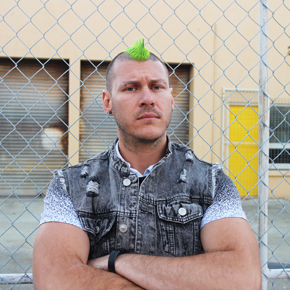Invisible Boys author Holden Sheppard on why he became an ambassador for suicide prevention organisation Lifeline WA

Holden Sheppard’s debut novel, Invisible Boys, deals with a number of mental health issues, as well as the difficulties that three young boys face in coming out gay in a country town.
Here he explains why he became an ambassador for Lifeline WA, and why organisations such as this provide vital support.
When I was growing up, I didn’t want to let my true self exist.
It wasn’t easy growing up gay in a country town like Geraldton. As far as I could tell, homosexuals only existed in the American sitcoms on TV, and usually as something to be laughed at, or avoided, or hated.
And I didn’t want to be hated.
Like many gay young people growing up outside of a major city, I felt like the only gay in the village. Compounding this, I was from a blue-collar background (gay men were unmasculine; poofters!), and Sicilian-Australian (gay men were finocchio, who would never bear children for the family), and I was raised Catholic (I probably don’t need to elaborate for this one).
In short: I had no messaging telling me that it was okay to be gay. So, by the time I was an older teenager, I reached the point where I didn’t want to be on the planet anymore. I wanted to take my own life.
It took a long time, but eventually, at 19, I reached out for help. I finally accepted my sexuality, and consequently found that I did, in fact, really want to be on this planet, and have an awesome life while I was here.
For a long time, I thought that meant my issues were resolved. If I’d accepted that I was homosexual, and had a boyfriend, and didn’t actively want to take my life, wasn’t that pretty much all I could hope for? Wasn’t that what being a survivor is all about?
But that was just it: I was in survival mode for a long time. I was depressed and anxious; I had addiction issues; and I was permanently angry at everyone around me. I was alive, but a mess. Surviving, not thriving.
Suicidal ideation is something we culturally find difficult to talk about, especially in the context of young people. We fear teenagers might not be ready for such a heavy theme, or we believe old myths that just by mentioning the topic we can ‘plant’ the idea of suicide in an impressionable mind.
But cloaking the subject in mystery and fear only maintains the sense of impenetrable silence felt by those who want to take their own lives. It exacerbates the suffering and hinders people’s ability to break the silence and seek help. And, as I learned in my late twenties, that suffering doesn’t end when a person decides not to take their own life. The deep levels of shame and self-loathing that often accompany suicidal ideation can linger in the air for years, as toxic and quietly damaging as asbestos fibres.
For me, things changed when I did two important things.
The first was to seek proper, long-term counselling to get help for my mental health issues.
The second important thing I did was to talk about my experiences with mental health through my art. In 2017, I finally gave myself permission to talk about real stuff – mental health, masculinity, sex, sexuality, male vulnerability – without the fear of people judging me, or thinking I wasn’t man enough.
And suddenly, my writing had real heart to it; real depth; real stakes. In just two months, my novel Invisible Boys came screaming out of me.
Invisible Boys won a couple of accolades long before publication, which made me realise that the world was ready to hear this kind of story.
But it was what happened next that really struck me.
I spoke at a charity fundraiser for Lifeline WA. After I shared my story of struggling with mental health, I was overwhelmed to see numbered paddles being raised into the air to donate, one after the other: a whole sprouting forest of them. Kind-hearted people were donating to Lifeline WA to help raise funds to train up phone counsellors to help people in crisis, because they were moved by my story.
That day, three men, all middle-aged or older, approached me after I came off stage. One after the other, they burst into tears in my arms and told me that they, too, had once wanted to take their own lives.
After I spoke at that fundraiser, the CEO of Lifeline WA asked me to become a Lifeline WA Ambassador. I said yes before she’d even finished the question. The thought that my past suffering could actually help others was healing in itself, because it meant I didn’t go through all that for no reason.
In sharing Invisible Boys with the world, and in my role as a Lifeline WA Ambassador, I hope I’m able to help others in some way. Breaking my own silence might help someone shatter theirs. It might help reduce the stigma we culturally hold around mental health and suicide. It might help someone to heal their past scars around their own suicidal ideation. It might prompt someone who is currently struggling to speak up and seek help for themselves. It might show other men and boys that vulnerability is actually a strength, because it helps us to not just survive but soar.
It might help someone, somewhere, to know that if a gay bogan from Geraldton can survive this, maybe they can too.
If you or anyone you know needs help, call Lifeline on 13 11 14, 24 hours, 7 days a week.
Invisible Boys by Holden Sheppard will be published on 1 October.
Teaching notes are available online here.



